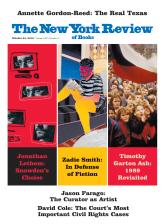In response to:
‘Ulysses’ on Trial from the September 26, 2019 issue
To the Editors:
I read with interest Michael Chabon’s fine piece “‘Ulysses’ on Trial” [NYR, September 26]. While the story was well told, I was profoundly disappointed by its lionization of Morris Ernst. Mr. Ernst was, unfortunately, far more than a clever lawyer who played crafty legal games on behalf of liberal ideals. In the 1950s, while national counsel of the ACLU, he repeatedly offered his services to the FBI to spy upon potential clients and report on the doings of that organization. Mr. Ernst’s betrayals of trust and willingness to disregard a lawyer’s duty of loyalty to his client were documented by Frank Donner in his book The Age of Surveillance (1980), as well as by Ronald Radosh and Joyce Milton in The Rosenberg File (1983). Mr. Ernst repeatedly approached his FBI contacts between 1950 and 1953, offering to attempt to insinuate himself in the legal defense team of Julius and Ethel Rosenberg with the apparent objective of “turning” the Rosenbergs. Although he was rebuffed, he displayed the same dogged efforts to achieve this objective as Mr. Chabon describes with respect to the defense of Joyce’s monumental novel. As far as literary efforts go, one might want to consider Ernst’s own December 1950 piece in Reader’s Digest, “Why I No Longer Fear the FBI.”
Stephan Landsman
Robert A. Clifford Professor of Tort Law and Social Policy Emeritus
DePaul University College of Law
Chicago, Illinois
Visiting Professor, Brooklyn Law School
Brooklyn, New York
To the Editors:
I am writing in regard to Michael Chabon’s article “‘Ulysses’ on Trial.” As the author of a forthcoming biography of Morris Ernst, I would like to correct a factual error. Morris Ernst was not a founder of the ACLU. Wikipedia and many other online sources incorrectly list Ernst as a “cofounder of the ACLU.”
When the ACLU was founded in 1920, Ernst was a rising New York lawyer practicing at Greenbaum, Wolff and Ernst, the law firm he created in 1915 with three friends (a firm that would become renowned for its work in media and publishing law). Ernst, who was involved in liberal causes, traveled in the same social circles as many of the ACLU’s leaders, but Ernst himself did not become active in the ACLU until the mid-1920s. Roger Baldwin, the talented, charismatic social worker who did cofound the ACLU, and who was a friend of Ernst’s, solicited Ernst’s legal advice on several of the ACLU’s free speech cases beginning around 1925. Ernst became increasingly involved in the organization and eventually became its general counsel in 1929, serving alongside cocounsel Arthur Garfield Hays, another eminent civil liberties attorney. Ernst went on to litigate some of the ACLU’s major free speech cases in the 1930s and 1940s. As both a lawyer and a widely read pundit and commentator, Ernst had a profound influence on free speech law, as well as popular thinking about freedom of expression.
That Ernst was a cofounder of the ACLU is a myth that may have been perpetuated, in part, by Ernst himself. Ernst was a flamboyant man who reveled in the spotlight. He was vain and insecure, with a penchant for exaggeration. In the 1970s, when Ernst was a very old man, then fading from the public eye, he suggested in correspondence that he had helped start the ACLU (one of Ernst’s many overblown claims about himself, particularly in his later years). Thanks to the Internet, this falsehood has been accepted by many as truth. Ernst would have been pleased.
Samantha Barbas
Buffalo, New York
To the Editors:
As author of a biography-in-progress of Bennett Cerf, under contract to Random House, I read with interest in the September 26 issue Michael Chabon’s lively reminder of the struggle to publish Ulysses, and was pleased at his effort to give Cerf his due in undertaking the court case with his partner and Random House cofounder Donald Klopfer, and the lawyers Morris Ernst and Alexander Lindey. Cerf’s role hasn’t always been so rightly recognized. However, since Mr. Chabon was primarily concerned with Ernst, certain factual matters about Cerf need amending.
Cerf’s father was born in New York, a Jew of Alsatian extraction whose forbears arrived in America in the 1830s; he wasn’t himself an immigrant from Alsace. Cerf never contemplated a career in lithography; he’d worked on Wall Street before entering publishing, and only worked with his father when he employed him at Random House! The Modern Library was a jewel, but hardly hidden; many publishers coveted it, including Richard Simon (Cerf’s predecessor at Liveright) and Max Schuster. Cerf and Klopfer met at Columbia, not as boys.
As Mr. Chabon points out, the Ulysses publishing story, like the novel itself, involves many twists and turns: far more than he could fit in a short essay. The cast of essential characters is larger; other American publishers were competing against Cerf and Klopfer to take the fight on as late as 1932; etc., etc. Ulysses has so much to teach us, it’s always worth revisiting, and we always find something new. So, too, the odyssey of its publication.
Gayle Feldman
New York City
This Issue
October 24, 2019
In Defense of Fiction
Snowden in the Labyrinth
The Real Texas



